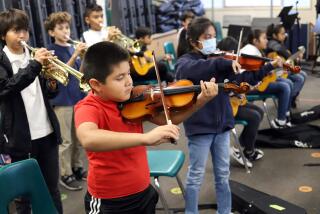D.C. school vouchers to lose funding
WASHINGTON — Congress is poised to do away with one of former President George W. Bush’s signature initiatives in education: the taxpayer-funded vouchers that enable students from low-income families in the District of Columbia to attend private schools.
About 1,700 children in kindergarten through 12th grade receive the $7,500 annual scholarships. Four times as many apply.
But a provision in the $410-billion spending bill that passed the Senate on Tuesday says that no funds will be appropriated for the program after the 2009-10 school year unless Congress reauthorizes it and the District of Columbia Council approves it. With the Senate’s action, the funding bill goes to President Obama for his signature.
If the voucher program is allowed to expire, the students would probably be back in the public system within two years.
“It would be really shocking to see 1,700 kids removed from the best schools they have ever known,” said Andrew Campanella, a spokesman for the Alliance for School Choice, a pro-voucher group.
The drama is being watched by advocates of the so-called school choice movement across the country.
The Washington program, the only voucher system in the country that uses federal funds, was enacted in 2004 by the Republican-controlled Congress, with some Democratic support.
Its advocates say it gives children in troubled school districts such as Washington’s an opportunity to obtain a higher-quality education. Urban school districts in New Orleans, Milwaukee and Cleveland have similar programs that use state money.
Detractors contend that the program subsidizes private or religious schools that, unlike public school districts, are not held accountable. And they say vouchers drain taxpayer money from public schools that truly need it, to private schools already flush from high tuitions. They also say there is no proof that students perform better in their new schools.
Democrats accuse Republicans who support the program of hypocrisy, saying they are imposing federal requirements on an autonomous school district to a degree they would never tolerate in their own states.
“How would the rest of the states feel if we suddenly determined what was going to happen in those states with regard to vouchers, school choice and charter schools?” Senate Majority Leader Harry Reid of Nevada said Tuesday.
The District of Columbia spends more per pupil than any school district in the nation, but still is plagued by low test scores, high dropout rates and underperforming schools. The voucher program was passed by Congress as a five-year pilot program. But it has been on House Democrats’ hit list for some time.
In a combative debate on the Senate floor Tuesday, Republican Sen. John Ensign of Nevada said Democrats were torpedoing the program at the behest of teachers’ lobbies such as the National Education Assn. and the American Federation of Teachers.
“What we are talking about here is putting kids ahead of the special-interest groups,” Ensign said as he launched an unsuccessful amendment to reauthorize the program.
The Obama administration is trying to find a compromise. Like Bush eight years earlier, Obama made education reform a linchpin of his campaign, often suggesting he would seek reforms that might rile groups like the NEA.
White House spokesman Thomas Vietor said Tuesday that Obama supports allowing the current students to remain in the program until they graduate from high school but not permitting the addition of new students.
“The president has repeatedly said that school vouchers are not a long-term solution to our educational challenges, but in this instance believes that we should try to find a way to keep from disrupting the students currently enrolled in this program,” Vietor said. “He looks forward to working with Congress to find a solution.”
Education Secretary Arne Duncan, the former Chicago public schools chief, opposes vouchers, as does Washington Mayor Adrian Fenty, but both have said that they believe the children in the program should be allowed to remain.
A running debate among those on both sides of the voucher issue is whether students benefit academically from attending private schools. Both sides have pointed to research that supports their position. But the Department of Education is expected to release a study this spring that promises a comprehensive look at how students have fared in the Washington program.
If the study shows that they have thrived, some Democrats, like California Sen. Dianne Feinstein, say they will consider supporting the voucher program further.
“I am prepared to continue to support this if the comprehensive evaluation, due this spring, shows that the program has value and students are improving,” Feinstein said Monday.
--
More to Read
Sign up for Essential California
The most important California stories and recommendations in your inbox every morning.
You may occasionally receive promotional content from the Los Angeles Times.










